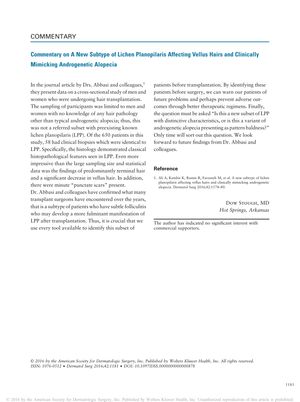Commentary on a New Subtype of Lichen Planopilaris Affecting Vellus Hairs and Clinically Mimicking Androgenetic Alopecia
September 2016
in “
Dermatologic Surgery
”

TLDR New hair loss subtype found, mimics common baldness.
The article discusses a study of 650 men and women undergoing hair transplantation, in which 58 were found to have a subtype of lichen planopilaris (LPP) that affects vellus hairs and clinically mimics androgenetic alopecia. The study found predominantly terminal hair and a significant decrease in vellus hair, as well as minute "punctate scars" present. The authors suggest that identifying these patients before surgery can prevent adverse outcomes through better therapeutic regimens. The question remains whether this is a new subtype of LPP or a variant of androgenetic alopecia presenting as pattern baldness.





